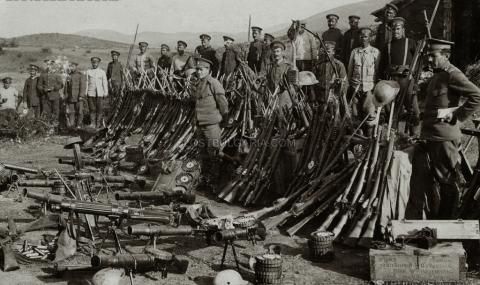On October 14, 1915, the Kingdom of Bulgaria declared war on the Kingdom of Serbia and joined the First World War on the side of the Central Powers.
At the outbreak of the First World War a year earlier, Bulgaria announced that it would maintain neutrality, but “with guns at its feet”. Both military blocs are trying to attract it to their side because of its important strategic location, archives.bg notes.
In May 1915, the Entente promised Bulgaria, against immediate intervention on its side, to receive after the end of the war Eastern Thrace up to the Media line – Enos, the “undisputed“ and part of the “controversial“ zone in Macedonia, as well as support in negotiations with Romania for Southern Dobrudja and a cash loan. The proposals have not been agreed in advance with Serbia and Greece, which are categorically against ceding their territory. At the same time, Germany and Austria-Hungary guaranteed the settlement of the Bulgarians in southern Serbia (Pomoravia) and all of Serbian Macedonia immediately after their conquest, immediate negotiations with Turkey for territorial concessions, as well as the return of the Bulgarian territories confiscated under the Treaty of Bucharest, if Greece and Serbia join the opposing bloc.
Despite the protest of the opposition, the Bulgarian government sided with the Central Powers. On August 24/September 6, 1915, he concluded a treaty and secret convention with Germany, supplemented by a Military Convention with Germany and Austria-Hungary. With them, Bulgaria undertakes to join the war on their side, receiving in return the lands taken from the neighboring Balkan states after the Inter-Allied War, and a loan of 200 million francs. On the same date, a convention was signed with Turkey, regulating the correction of the border in favor of Bulgaria along the lower reaches of the Maritsa River.
On September 10/23, 1915, Bulgaria carried out a general mobilization, and on October 1/14, declared war on Serbia. The First and Second Armies advanced against it, and the Third Army was left in Northern Bulgaria against a possible threat from Romania. At the beginning of the war, the Bulgarian army numbered 530,000 soldiers and officers, but by the end of the war they reached 850,000.
The Bulgarian troops managed to break the resistance of the Serbian and the Treaty units that came to their aid. Timoshko, Pomerania and Macedonia were liberated. The Serbian armed forces have been completely defeated. By order of the German military command, the advance was halted at the Greek border, which subsequently allowed the Entente to open a second front against the Central Powers. The Moravian and Macedonian Military Inspection Districts were established in the liberated territories and their administrative arrangements are proceeding according to Bulgarian legislation. Later, a third military inspection district was formed in the White Sea.
In 1916, a balance of power was established between the warring factions, and positional (trench) warfare was imposed on both the Western and Southern fronts.
The situation continues for the next two years.
In 1918, Bulgaria and its allies fell into a difficult economic situation. There is a serious stagnation in the economic life of Bulgaria, the maintenance of the huge army is unbearable for the country.
Essential goods are disappearing, the black market and speculation are rampant. Hunger riots broke out in a number of places, followed by the so-called women's riots.
The opponent makes a breakthrough in Good Field. This causes the outbreak of the Military Uprising. It has been extinguished. But, on September 29, Bulgaria was forced to sign an armistice in Thessaloniki, with which it exited the First World War. The armistice provides for the withdrawal of Bulgarian troops from the territory of Serbia and Greece; immediate demobilization, handover as prisoners of war to the Bulgarian troops located west of Skopje.
Tsar Ferdinand I is forced to abdicate in favor of his son Prince Boris Turnovsky.
The territorial and economic consequences for Bulgaria of the war were catastrophic. By virtue of the Treaty of Noi signed on November 27, 1919, it lost Vardar Macedonia together with the Strumica region, which passed into the borders of the Serbo-Croatian-Slovenian kingdom. Romania gets all of Dobrudja. The White Sea was initially placed under the management of the Agreement, but later passed within the boundaries of Greece. Eastern Thrace remains part of Turkey. The treaty takes away Bulgaria's sovereign right to maintain its armed forces, colossal reparations in the amount of 2.25 billion gold francs were imposed on it.
Besides over 100,000 soldiers and officers killed and missing on the battlefields, tens of thousands were wounded and captured. The country is completely destroyed economically. Bulgaria is experiencing a second national catastrophe, which also puts a tragic end to the national ideal.
